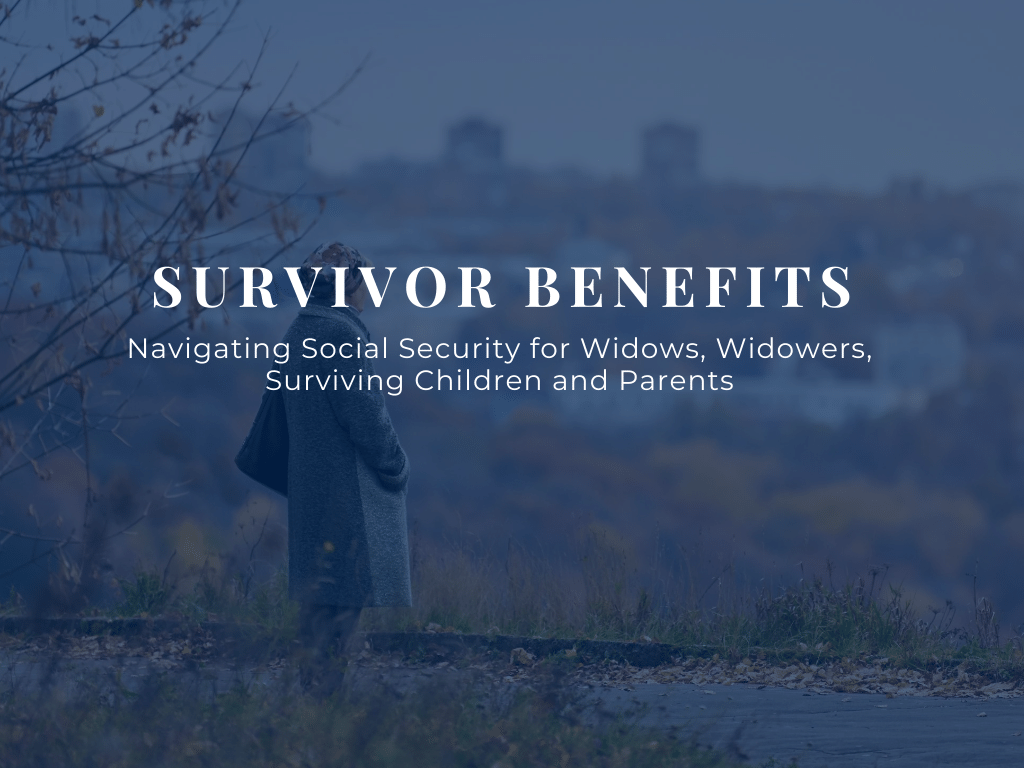
For many Americans today, Social Security is one of their most substantial retirement assets. In fact, nearly all U.S. workers and their families will qualify for some benefits under the system, originally enacted in 1935. Social Security benefits can be viewed as a portion of the “replacement income” that people need once they decide to retire.
While it is certainly a topic that is difficult for many of us to contemplate, what happens when we succumb to the inevitable and depart this life? What benefits under the Social Security program are available for surviving partners and children? Do parents of the deceased qualify for benefits?
Social Security Benefits for Widows, Widowers
There is an important distinction between a spousal benefit and a survivor benefit in the Social Security Administration (SSA) world. While both benefits are based entirely on the spouse’s work history, spousal benefits are paid when the husband or wife is still alive. Survivor benefits only apply once a spouse has passed.
Spousal benefits can be as much as half of the full benefit amount, due to a worker’s full retirement age (FRA). Spouses that are at least 62 years of age may begin drawing benefits, but they will be paid at a reduced amount until FRA. Spousal benefits are automatically converted to a survivor benefit once the SSA has received a death notice. (Source: SSA Online here)
Survivor benefits may comprise 100% of the deceased worker’s last Social Security benefit, and they will include any delayed retirement credits the worker may have accrued by not taking any benefits until after FRA (up to age 70). Like other programs with the SSA though, benefits for the surviving spouse are permanently reduced if the deceased worker had applied for early benefits.
Widows and widowers are eligible to claim a survivor benefit at age 60 or older (age 50 or older if they are disabled). Survivors can claim a benefit equal to 71.5% of the late spouse’s worker’s benefit. That benefit will increase to 100% if they file at their own FRA.
Benefits are still paid in the instance a husband or wife dies before filing for benefits, regardless of the age of the deceased. When surviving spouses attain full retirement age, they should qualify for 100% of the survivor benefit or their own benefit, whichever is greater.
When Do Children Qualify for Social Security Survivor Benefits?
In cases where a parent who is a worker dies or becomes disabled, unmarried children qualify for Social Security benefits under the following circumstances:
- If they are an unmarried child younger than age 18 or 18-19 years old and a full-time student (grade 12 or less)
- If they are disabled before age 22 and remain disabled, they can get benefits at any age
- In some cases, stepchildren, grandchildren and adopted children are also eligible for social security
In the situations above, parents or grandparents must be deceased or disabled and able to qualify for benefits on their own. For retirement benefits, they must be at least 62 years old and have worked and earned enough Social Security credits (an equivalent of 10 years working history). (Source: SSABenefits.gov)
For any family, each child is capped at 50% of a parent’s full retirement or disability benefit. Where survivor benefits are paid, they may receive up to 75% of the deceased parent’s basic benefit. There is an overall family limit of 150 to 180% of a parent’s full benefit amount, as determined by the SSA (Source: SSA.gov Survivor Benefits).
When Do Parents of the Deceased Qualify for Social Security Survivor Benefits?
Parents of the deceased also qualify to receive benefits under the following stipulations:
- They must be at least age 62 and were previously receiving at least 50% of their support from their working child
- They cannot be eligible to receive a benefit on their own that is greater than what the child’s work history would support
- They must not have married following the child’s death
Understanding Social Security Benefits for Survivors Conclusion
The loss of a loved one is felt in many ways and will likely alter financial outlooks, sometimes in a significant way. For most of us, that outlook will include Social Security benefits. If you have questions on how a death in the family will impact those benefits, have a conversation with your financial advisor. He or she can provide answers and give you peace of mind about your overall retirement picture.
 Bryan Blackburn, CFP® serves as Financial Planner and Wealth Advisor at Carnegie Investment Counsel. As a CERTIFIED FINANCIAL PLANNER™, he manages relationships for select clients. Bryan provides holistic financial planning advice; including retirement planning, cash flow analysis, tax planning, education funding, and estate planning and investment analysis.
Bryan Blackburn, CFP® serves as Financial Planner and Wealth Advisor at Carnegie Investment Counsel. As a CERTIFIED FINANCIAL PLANNER™, he manages relationships for select clients. Bryan provides holistic financial planning advice; including retirement planning, cash flow analysis, tax planning, education funding, and estate planning and investment analysis.
Got Questions? Ready to Meet With a Financial Advisor?
Schedule an appointment today to learn more about how Carnegie can help with financial planning and wealth management.



